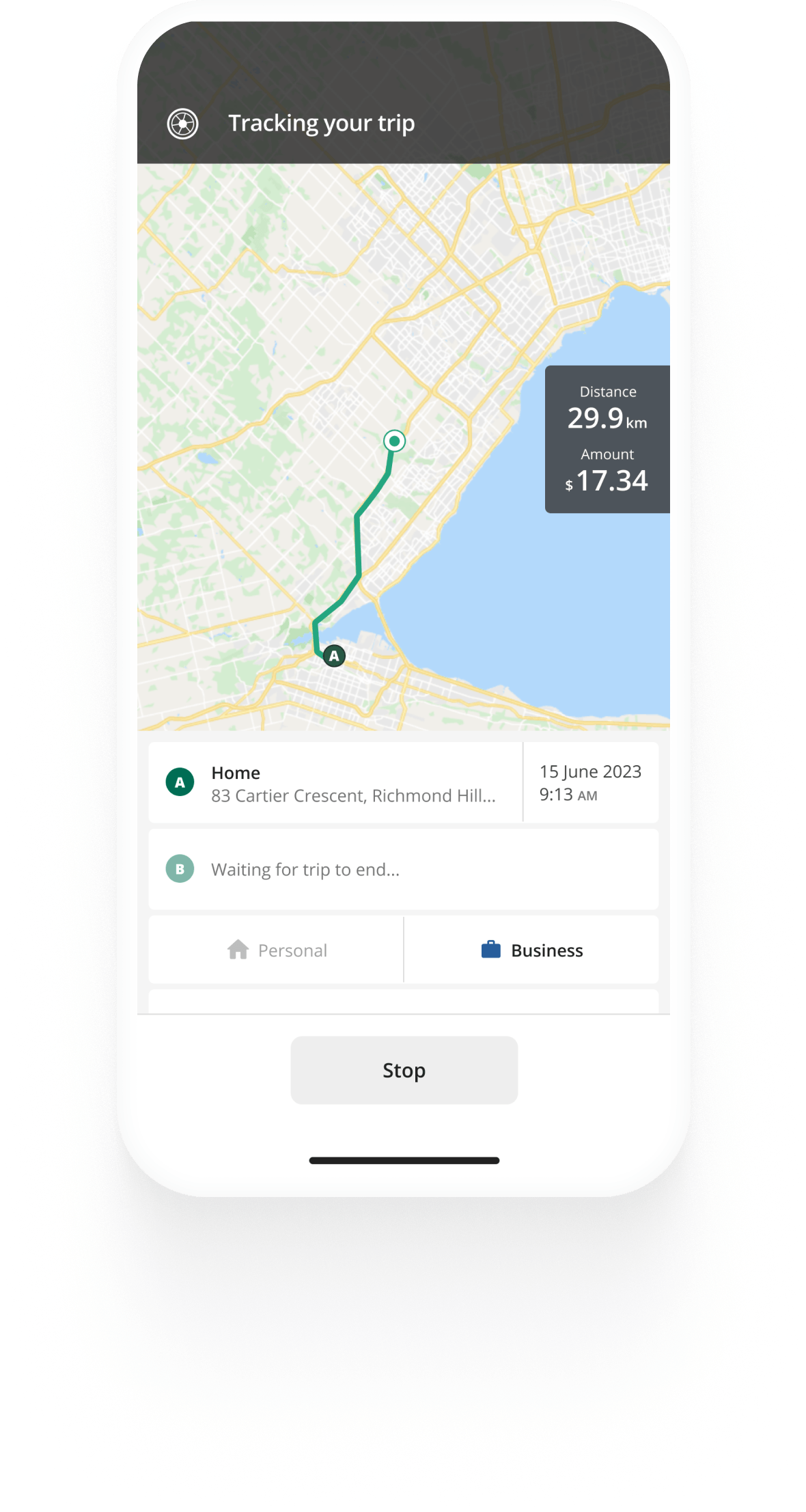Track mileage automatically
Get startedCRA Mileage Rates
The CRA sets mileage rates on a per-kilometre basis every year. These rates define the amount that the CRA considers a reasonable allowance when employers calculate the allowance for employees who use their own vehicles for business-related activities.
The allowance is tax-free as long as it matches the reasonable CRA mileage rate, ensuring that employees get fair compensation for using their vehicle for business travels. If no workplace reimbursement is paid, employees can deduct it from their taxes instead.
CRA mileage rate for 2025
The current CRA mileage rates for 2025 are:
- 72¢ per kilometre for the first 5,000 kilometres
- 66¢ per kilometre over 5,000 kilometres
- An additional 4¢ per kilometre in the Northwest Territories, Nunavut, and Yukon.


Track business driving with ease
Trusted by millions of drivers
Automate your logbook Automate your logbook

Automatic mileage tracking and CRA-compliant reporting.
Get started for free Get started for freeHistoric CRA mileage rates
| Financial Year | Rate for the first 5,000 km | Rate after 5,000 km |
Additional allowance in the territories |
|---|---|---|---|
| 2025 | 72¢ | 66¢ | 4¢ |
| 2024 | 70¢ | 64¢ | 4¢ |
| 2023 | 68¢ | 62¢ | 4¢ |
| 2022 | 61¢ | 55¢ | 4¢ |
| 2021 | 59¢ | 53¢ | 4¢ |
| 2020 | 59¢ | 53¢ | 4¢ |
| 2019 | 58¢ | 52¢ | 4¢ |
| 2018 | 55¢ | 49¢ | 4¢ |
| 2017 | 54¢ | 48¢ | 4¢ |
| 2016 | 54¢ | 48¢ | 4¢ |
| 2015 | 55¢ | 49¢ | 4¢ |
Annual adjustment of mileage rates
The CRA revises the official mileage rates every year. When establishing the reasonable cents-per-kilometre rate, they consider both fixed and variable vehicle operating costs.
Variable costs include fuel, repair and maintenance expenses.
Fixed costs include interest on financing, insurance, licensing, registration, and depreciation.
Conditions for tax-free per-km allowance
The per-kilometre allowance for work-related driving will not be taxed as income as long as the conditions below are met:
- The allowance provided corresponds to the distance driven for business activities
- It is calculated using the reasonable rate set by the CRA
- The employee was not already reimbursed for the motor vehicle expenses incurred. Note that e.g. toll, parking and ferry charges are not included in the rate, and should be calculated separately.
If the allowance is calculated using a custom rate
If an employee uses their own vehicle in the service of their employer, and the allowance provided by the employer is either too low or too high compared to the CRA rates, it is included as a taxable benefit to the employee’s income. In this case the employee can claim a tax deduction for their motor vehicle expenses.
Flat rate car allowance
Another option would be to pay a flat-rate allowance to employees irrespective of the number of kilometres driven. This will also be a taxable benefit and included in the employee’s income since it does not meet the reasonable per km rate set by the CRA.
In cases where the employee receives a taxable mileage reimbursement, the employer should complete the relevant sections in form T2200 and send it to the employee so that the employee can claim their out-of-pocket motor vehicle expenses.
FAQs

Tired of logging mileage by hand?
Effortless. CRA-compliant. Liberating.
CRA Mileage Guide
- For Self-Employed
- For Employees
- For Employers
- Mileage Logbook Requirements
- How To Calculate Mileage Reimbursement
- Is Car Allowance Taxable?
- Claim Motor Vehicle Expenses In 5 Steps
- Current and Historic CRA Mileage Rates
- Historic Mileage Allowance Rates
- Current CRA Mileage Rates